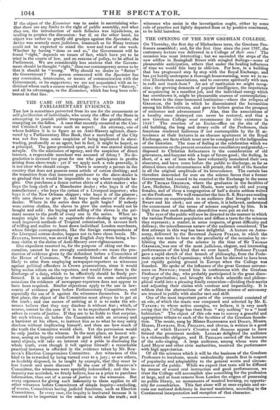THE CASE OF MR. ZULUETA AND HIS PARLIAMENTARY EVIDENCE.
THE law is sometimes perverted from its use for the amusement or self-glorification of individuals, who usurp the office of the State in attempting to punish public trespassers, for the gratification of trampling on the fallen. A case that recently occurred at the Cen- tral Criminal Court wore such an aspect. An attorney, one of whose hobbies it is to figure as an Anti-Slavery agitator, disco- vered by a Parliamentary Blue Book, that a merchant of the City was not free from some suspicion of being implicated in slave- trading, professedly as an agent, but in fact, it might be hoped, as a principal. The game promised sport, and it was started without scruple. On the admission of agency, and the suspicion of direct interest, a respectable merchant was accused of felony No de- gradation is deemed too great for one who participates in profits arising from slave-trade: yet if we apply such a rule generally, it is not clear who should escape. There is scarcely a person in the country that does not possess some article of cotton clothing; and the transition from that innocent purchaser to the slave-dealer is so gradual that it would be impossible to say where turpitude be- gins. One purchases a dozen cotton shirts of a shirt-maker ; who buys the long cloth of a Manchester dealer ; who buys it of the manufacturer ; who buys the cotton of a Liverpool importer ; who buys it of the New Orleans shipper; who buys it of the planter ; who uses slaves to grow it, and buys those slaves of the slave- dealer. Where in the series does the guilt begin ? If nobody wore cotton clothes, the slaves to grow the cotton would not be bought and sold : the buying and selling of the slaves is the pri- mary means to the profit of every one in the series. When at- tempts might be made to supersede slave-dealing by setting to work improved methods of Tropical colonization, it savours both of trifling and malice to hunt down individual London merchants, whose foreign correspondents, like the foreign correspondents of the Liverpool cotton-dealer, happen not to have clean hands. Mr. ZULUETA, however, was saved by an English Jury from being a hu- man victim at the shrine of Anti-Slavery over-righteousness.
One expedient resorted to, for the purpose of eking out the ac- cusation, cannot be too strongly condemned—we mean the pro- duction of evidence given by the defendant before a Committee of the House of Commons. We formerly hinted at the detriment likely to arise from employing newspaper-reporters as witnesses against political offenders in Crown prosecutions, since it would bring undue odium on the reporters, and would fetter them in the discharge of a duty, which to be effectively should be freely per- formed. It is satisfactory to observe that on some subsequent occasions the evidence of newspaper-reporters does not appear to have been required. Similar objections apply to the use in law- courts of evidence given before Parliamentary Committees, and especially the use of it against the witnesses themselves. In the first place, the object of the Committee must always be to get at the truth ; and one means of arriving at it is to make the wit- nesses believe that they may disclose it without fear ; which, of course, cannot be the case if it is to be reproduced against them- selves in courts of justice. If they are to be liable to that surprise, let each witness sit before the Committee with an attorney and a barrister at his elbow, to instruct him as to what he may safely disclose without implicating himself; and then see how much of the truth the Committee would elicit. Yet the permission would be only justice to the witness. In the next place, an honest wit- ness, seeing an inquiry conducted in good faith and for great ge- neral objects, will take an interest and a pride in disclosing the whole truth, even though it tell against himself: a remarkable practical instance is afforded in the evidence taken by Mr. Ron- BUCK'S Election Compromises Committee. Are witnesses of this kind to be rewarded by being turned over to a jury ; or are others, as laudably disposed, to be taught by example, that they must be less honest and more discreet ? In the case of Mr. ROEBUCK'S Committee, the witnesses were specially indemnified ; and the in- demnity was accbrded, we firmly believe, less as a price to purchase information, than out of a sense of justice to the witnesses. But every argument for giving such indemnity to them applies to all other witnesses before Committees of simple inquiry—excluding, of course, Committees having judicial functions, such as Election Committees. In every case, the inquiry is instituted because it is assumed to be important to the nation to obtain the truth ; and
witnesses who assist in the investigation ought, either by some rule of practice not lightly departed from or by positive enactment, to be held harmless.


























 Previous page
Previous page